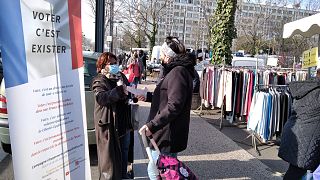Democracy
30 years after the emergence of emerging democracies in Africa, the model seems to be under severe strain.
Today we talk to Francis Laloupo, journalist and essayist, author of the book "Blues démocratique de 1990 à 2020", in which he analyzes the reasons for this democratic decline and the threats facing the democratic model.
Democratic Blues, the title of your latest book says it all, to what do we owe this melancholy and this decline in the attractiveness of the democratic model?
Francis Laloupo: In my book I put in parallel, on the one hand, the crisis of the processes of democratization in Africa which intensified these last ten years and the unprecedented and historical crisis of the old democracies in the world. I study the factors of the crisis of impediment and democratic backsliding.
The factors of the crisis of democratic processes in Africa are of various origins.
If we focus on the emerging democracies in Africa, we have witnessed a constant balance of power between democratic activists on the one hand and the forces of autocratic and authoritarian restoration on the other.
Over the last thirty years, we have seen the multiplication of factors that prevent and reverse democracy, such as electoral fraud, the exclusion of opponents from electoral competition, the imprisonment or repression of opponents, and more recently, constitutional coups by means of opportunistic modification of the constitution, which has led to what is now called the third mandate crisis. All of these factors have contributed to slowing down the process of democratization on the continent and have interrupted the democratic conquest begun in the 1990s.
Today we are witnessing an important turning point, that is to say the difficulty for Africans to conclude or at least to complete the process of democratization, and the return in force of the forces of autocratic restoration.
As you said, we are noticing a new bipolarity between the democratic world and the rise of new autocracies like China, which is rather well established in Africa, and Russia, which enjoys a growing influence on the continent. How can a greater Russian influence affect Africa’s political choices?
Francis Laloupo : For several years now, we have seen a diversification of external partnerships in Africa, with particular alliances or systems of cooperation between Africa and various foreign partners, be they Western or other partners such as Russia and, to a large extent, China, which has become one of the main investors on the African continent.
I think that the time has come to go beyond a purely commercial approach to these partnerships and to consider the impact of these cooperative ventures on economic choices in Africa and on the political impact that these systems can have on the evolution of the democratization process and on the various political positions of African countries on the international scene.
Today, there is a recomposition of the poles of power on the international scene, so Africa is faced with choices. The question is to know if these choices are made in complete independence and if Africans determine themselves essentially according to their interests or to play the referee between the West and the non-democratic powers, which today have clearly declared a form of confrontation with the Western democracies.
How can we regain the enthusiasm of the multiparty system of the 90s, how can we fix this model when there is a clear trust gap between the populations and their political leaders?
Francis Laloupo : You are absolutely right, you used a very accurate word that I use in my book, how to recover the democratic enthusiasm that we find in the old democracies or in the emerging democracies?
You are indeed right, we must rediscover this enthusiasm for the conquest of democracy because it is on this democratic foundation that all the historical aspirations and demands of African countries in terms of development, social conquest, social progress and progress in various sectors will be realized. One of the most important is education, education for all and shared well-being for all.
Interview by Pascale Keingna











Go to video
Cameroon's presidential election gathers momemtum as candidates file for the October vote
01:13
Voter turnout in Togo's municipal elections overall low
00:50
Cameroon: Biya reshuffles top military ranks days after re-election bid
01:21
Cameroon 2025: Maurice Kamto seeks to vie on a different political outlook
01:52
Togo’s security forces cast early votes ahead of high-stakes municipal elections
02:55
In Cameroon, Paul Biya's candidacy divides his party